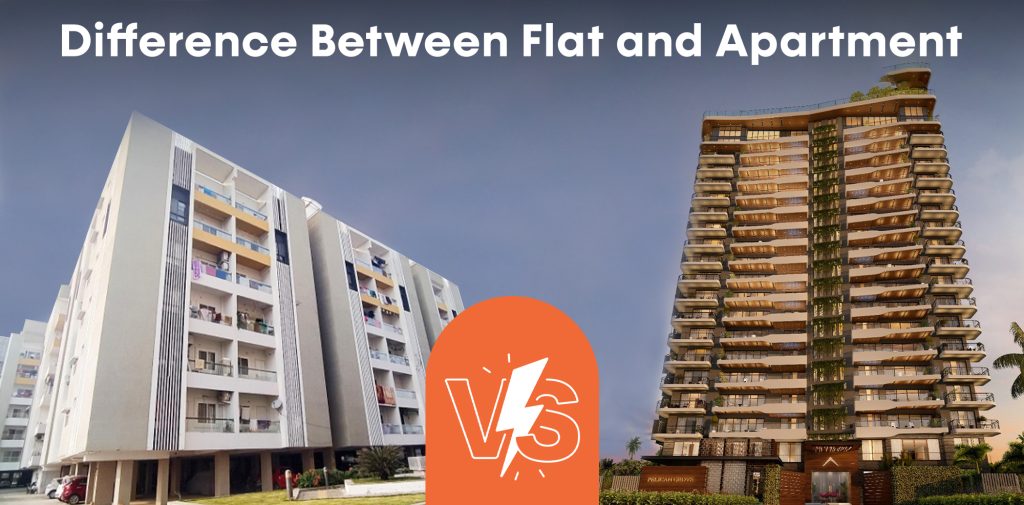Living in an energetic residential community with a wide range of facilities, a multicultural population, and easy access to necessities is extremely desirable. That’s why where you choose to live can have a big influence on your lifestyle and happiness level.
The majority of people are enticed to living in tall buildings in the center of a busy city. Living close to a range of amenities that are geared toward all age groups is most commonly achieved by renting an apartment or flat. Are an apartment and a flat different things, or are they just names that are used interchangeably? To find out more about the history and significance of these two names, keep reading.
Everybody has been there, weighing the advantages and disadvantages of the “flat” in a charming old building versus the “apartment” with a gym and swimming pool, which seem like great possibilities. If buyers are aware of these concepts and their subtleties, they will be more equipped to make informed decisions when looking for a property. You will be able to choose the kind of house that is best for your family if you use the information in this article to better understand these subtleties.
So what does a “flat” actually mean?
This provides an explanation for the query, “What is flat?” Flats are primarily one-story living spaces with bedrooms, kitchens, baths, and a common hallway. In addition, the number of rooms in an apartment is determined by its size. A “2BHK flat,” for instance, is a flat that has a kitchen, a hall, and two bedrooms. Regarding the apartments’ location, they might be located in independent buildings or apartment complexes. That is, therefore, the main difference. Every apartment building has apartments, although not every apartment building may include all of the apartments.
How does one define an apartment?
An apartment is frequently a multi-story residential structure that houses several units. It operates as a single, large community with its own water supply system, security measures, and entrance and exit gates. As a result, if your flat is located in a complex or building, you will enjoy additional benefits. For example, backup power supply. There is more security when you live in a gated community. There are also security staff, whose salaries are covered by the combined contributions of every person who lives in that building or neighbourhood.
What Distinctions Are There Between a Flat and an Apartment?
Flats and apartments are similar in many ways, with most usage being restricted to a particular area. The British, for instance, prefer the term “flat,” but the term “apartment” is more frequently used in the US.
Apartment vs. Flat: Definition
A flat, as used in British English, is a group of rooms that together make up a single apartment; these are typically found on one floor of a bigger structure. All of them together are called an apartment block.
Places that generally imply a sense of prosperity are referred to as “apartments” by Americans. This term describes a collection of residential rooms—which might even cover two stories—in a building that is home to several homes. The word “apartment” is more commonly used in real estate and architecture in the United Kingdom.
Apartment vs. Flat: Terminology
The phrases “apartment” and “flat” are frequently used in both American and British English.
Flat vs. Apartment: Based on Target Audience
An apartment may be associated with middle-class living, depending on its location.
An apartment often targets a more affluent customer and is linked with luxury.
Apartment vs. Flat: Features
Apartments frequently come equipped with every basic amenity needed for residents to live comfortably.
Conversely, apartments provide a multitude of advantages along with opulent living.
Flat vs. Apartment – by Storeys
Typically, apartments are one-story structures.
Apartments often have two stories. A duplex is naturally connected to an apartment.
What should you purchase?
Before you begin the process of purchasing your own home, you must first understand your criteria. Are worthwhile things to think about, whether it’s for your own use or as an investment opportunity, etc.
What separates a condo from an apartment
Even though they could appear and feel the same, the primary distinction between an apartment and a condominium is who owns the property. While owning a condo, the apartment is typically rented. The condo owner is then required to make regular contributions to the Homeowners’ Association.
Difference Between Condos and Apartments
Who owns the property is the primary difference between an apartment and a condo, even if they both feel and look the same. Apartments are often rented, whereas condominiums are owned.
Ownership.
A landlord or a property management business is normally responsible for renting out an apartment. In exchange for paying rent, the tenant pays ownership fees but does not own the unit itself. A condominium, short for condominium, on the other hand, is a privately owned apartment housed inside a bigger complex. Owners of condominiums share ownership of the complex’s common areas and amenities, but they are still legally the owners of their individual apartments.
Property Management.
Landlords or property management companies are responsible for the upkeep, repairs, and other administrative duties associated with managing apartments. In contrast, the homeowners’ association (HOA) that oversees condos is made up of condo owners who decide on matters pertaining to common areas, policies, and general complex management.
Versatility.
When it comes to lease agreements, apartments provide greater flexibility. In order to facilitate moving, tenants can usually choose to rent for shorter terms, such as per month or annual leases. However, because they must sell or rent out their condo before moving out, owners of condos have fewer options when it comes to moving out. Owners of single-family homes, on the other hand, are free to change and personalize their units.
Financial considerations.
The monthly rent for renting an apartment is subject to change based on the landlord’s or property management’s discretion. In contrast, owners of condos must pay monthly HOA dues in addition to their mortgage if they obtained a loan to buy the unit. These levies support the HOA’s management and upkeep of the common facilities and amenities.
Responsibility
Apartment residents typically have less obligations for upkeep and repairs, as these are typically handled by the landlord or property management. The upkeep and repairs of each individual condo unit, however, are the responsibility of the owners. By paying their homeowners’ association dues, they also assist with the upkeep and maintenance of shared amenities.
As part of their contribution to the efficient operation of their community, Indian apartment owners and renters also pay maintenance fees to the Resident Welfare Associations.
Pros and Cons of Purchasing an Apartment or Flat in India.
There are several advantages to renting an apartment or a flat, including:
Security
Your family’s safety and security are guaranteed at all times, so you don’t need to worry. Round-the-clock security via guards and CCTV ensures your children’s safety in the play area and corridor. All things considered, gated communities are great for individuals of all ages.
Host of amenities
Apartments provide a variety of amenities, including a swimming pool and a gym, making them convenient to reach. Your youngsters enjoy a wonderful playground, while their grandparents can keep themselves entertained by visiting a lush park or a reflexology track.
Advanced Interpersonal Skills.
Your children will develop good interpersonal skills as a result of the high population density. At your convenience, you too can decide whether to spend time alone with yourself or meet up with friends at the park.
Tax Benefits
Owning a home and obtaining a home loan results in significant tax benefits. This excellent investment allows you to save money while reaping rewards.
The only thing that makes an apartment less desirable than a house is that you can’t make the apartment your own. It is impossible to alter the living room’s size; instead, you can only personalise the appearance of your house with the aid of furniture and décor pieces. This may have been possible if you built your home on your land.
Benefits Of Apartments & Flat In India
When searching for your dream home, thorough research and diligence are essential. This includes understanding the advantages and disadvantages of different options.
Apartments Advantages and Disadvantages
| Advantages | Disadvantages |
| One significant advantage of living in an apartment is the access to a wide range of amenities and facilities like fitness centres, swimming pools, gardens, playgrounds and community spaces, enhancing convenience and recreational opportunities for residents. | In an apartment complex, you do not have much of a voice in decisions because there are more dwelling units there, especially if you don’t agree with the majority. It is unlikely that discussions will take place regarding the quality of the building, the materials utilised, or the facilities the developers want to offer. |
| Security is also a key advantage, with many apartments implementing measures such as gated entrances, surveillance cameras and intercom systems to ensure the safety and well-being of residents. | Typically, apartment complexes have a higher number of construction regulations. Owners of apartments are frequently subject to strict rules on parking, guest parking, pet ownership, renovations, and other matters. |
| Furthermore, apartment complexes foster a sense of community, providing opportunities for social interaction, neighbourly connections, and shared experiences. The location and convenience of apartments are often advantageous, as they are typically situated near essential amenities and offer easy access to shopping centres, schools, healthcare facilities and public transportation. | Apartment owners typically reside in less centrally placed buildings, which may result in lengthy commutes to jobs and schools. |
Flats Advantages and Disadvantages
| Advantages | Disadvantages |
| Flats in India are often preferred for their cost-effectiveness, making them an appealing choice for individuals or families with budget constraints. They offer affordability compared to apartments, allowing more financial flexibility. | Because there may only be one or two security guards to watch over the building, flats often have less secure entry. |
| Flats provide residents with greater freedom in customising and designing their living space to align with their personal preferences. | When there are fewer residents to pay for and monitor these services, cleanliness and upkeep might also become an issue. |
| Being situated in smaller buildings, flats also offer a sense of independence and privacy that may be lacking in larger apartment complexes. | Due to space constraints, the facilities in flats may be restricted. Thus, you might not discover the amenities—like gaming rooms, gyms, sports courts and swimming pools—that you do in apartment buildings. |
Tips For Buying A Flat Or Apartments In India
● Ascertain Your Financial Horizon: Determine Your Budget: Meticulously assess your financial capabilities and establish a realistic budget that aligns with your aspirations.
● Research Locations: Engage in exploring of diverse neighbourhoods, contemplating the proximity to esteemed educational institutions, bustling workplaces, a plethora of amenities and an efficient transportation network.
● Verify The Builder/Developer: Do thorough research, ensuring that the chosen builder or developer exudes unparalleled excellence in terms of delivery of projects, quality and so on.
● Financing Options: Explore different financing options, such as home loans and compare interest rates and terms offered by various banks or financial institutions.
● Amenities And Facilities: Evaluate the available amenities and facilities within the property so that they align with your preferences and lifestyle, enabling you to live a fulfilled life.
● Future Development Plans: Unveil the future development projects and infrastructure plans that grace the vicinity. Allow this knowledge to infuse your decision-making process, as it can impact the value and livability of the property.
Also Read - Investing In A Flat Or House: A Comprehensive Guide
What Should You Buy?
The choice between a flat vs an apartment depends on individual preferences, budget, and specific requirements. Consider factors such as size, location, amenities, maintenance responsibilities, and cost to make an informed decision that aligns with your needs and lifestyle.
We hope that this blog has shed light on what is the difference between a flat and an apartment, enabling you to make a more informed decision. Understanding the distinction between these terms is crucial when considering real estate options. You can also get flat for rent on Lets Rentz.



